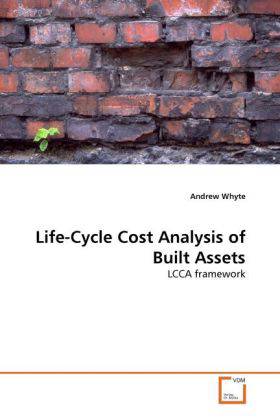
Bedankt voor het vertrouwen het afgelopen jaar! Om jou te bedanken bieden we GRATIS verzending (in België) aan op alles gedurende de hele maand januari.
- Afhalen na 1 uur in een winkel met voorraad
- In januari gratis thuislevering in België
- Ruim aanbod met 7 miljoen producten
Bedankt voor het vertrouwen het afgelopen jaar! Om jou te bedanken bieden we GRATIS verzending (in België) aan op alles gedurende de hele maand januari.
- Afhalen na 1 uur in een winkel met voorraad
- In januari gratis thuislevering in België
- Ruim aanbod met 7 miljoen producten
Zoeken
€ 71,95
+ 143 punten
Omschrijving
A framework to assist life-cycle costing analysis (LCCA) of building is increasingly important in today's construction industry, as designers strive for sustainability in the creation and maintenance of built assets. Three fundamental stages in modelling relative to the whole-cost of building are important: (i)the description of the inter- relationship of the factors that make up life-cycle costing; (ii)the conceptual LCCA model framework; and, (iii)the implementation of the LCCA model into a central encyclopaedia of information held within an over-arching design data-base. This work concentrates on the initial two stages, analysing the inter-relationship of life-cycle factors; this is the necessary antecedent to proceed towards the realisation of an LCCA model for inclusion into an overall design tool to facilitate building- information-modelling (BIM). A life-cycle cost analysis framework is presented, as an essential part of a design model to support decision-making and BIM for building design and construction processes.
Specificaties
Betrokkenen
- Auteur(s):
- Uitgeverij:
Inhoud
- Aantal bladzijden:
- 116
- Taal:
- Engels
Eigenschappen
- Productcode (EAN):
- 9783639336368
- Verschijningsdatum:
- 22/02/2011
- Uitvoering:
- Paperback
- Formaat:
- Trade paperback (VS)
- Afmetingen:
- 152 mm x 229 mm
- Gewicht:
- 181 g

Alleen bij Standaard Boekhandel
+ 143 punten op je klantenkaart van Standaard Boekhandel
Beoordelingen
We publiceren alleen reviews die voldoen aan de voorwaarden voor reviews. Bekijk onze voorwaarden voor reviews.









